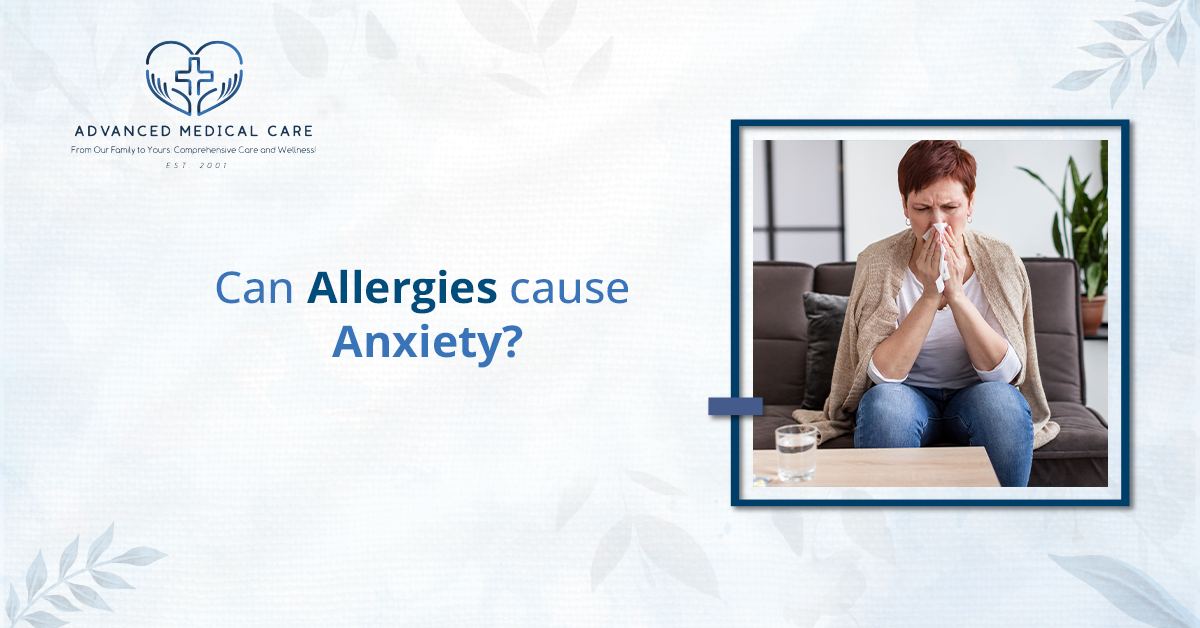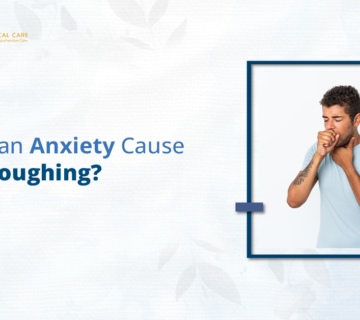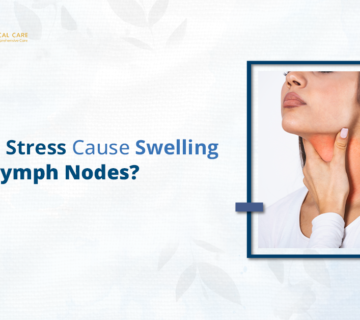Most people experience allergic symptoms or suffer from anxiety. Nonetheless, such cases are normally unrelated. Nonetheless, recent research findings indicate that there might be a link between them.
If you ever were anxious in the middle of an allergy season, you may ask yourself, can allergies cause anxiety?
Let’s find out how allergies affect mental and physical health, including anxiety.
At Advanced Medical Care, we as practitioners have seen the impact allergies can have both physical and mental. We can work on developing a personalized plan with the help of our allergy specialists that will help you feel better. Don’t let allergies be the master of you; contact us today.
What Are Allergies?
Allergies happen when the immune system misreacts to things like pollen, dust, or some foods. The body creates histamines for the fight against the “invader.”
Accordingly, these reactions lead to the usual symptoms, including:
- Sneezing
- Runny or blocked nose
- Itchy and watery eyes
- Skin rashes
- Fatigue
Can Allergies Cause Anxiety and Dizziness?
Yes, they can! Allergies often bring on anxiety and dizziness. Allergies often trigger anxiety for a few reasons. When your body meets allergens, it releases histamines and other chemicals. This reaction can lead to physical symptoms like:
- Congestion
- Headaches
- Fatigue
These issues create discomfort and stress, which can trigger anxious feelings. Allergies can cause inflammation. This may affect the inner ear or disrupt breathing, leading to light headedness.
Allergies can be embarrassing and isolating. They make people not wanting to socialize due to allergies, causing anxiety and mental health issues.
Allergens can make the body too sensitive. This can raise stress and fuel anxiety. Managing allergies directly might mitigate these irritating effects.
Seasonal Allergies and Anxiety
Spring brings both seasonal allergies and anxiety. High pollen counts create physical and emotional chaos. Sneezing, runny noses, and itchy eyes cause frustration.
Fear of allergic reactions adds stress. Generalized anxiety disorder can get out of control with seasonal allergies.
Can Anxiety Make Allergy Symptoms Worse?
Allergies and anxiety are linked. Both can make each other worse.
Besides, anxiety can exacerbate allergy symptoms and thus make them difficult to manage. This pattern repetition is observed with each condition making the other worse.
Comprehensive awareness of how one affects the other is a must for finding balance and relief.
Can Anxiety Cause Sinus Problems?
Yes, it can. An anxious person often experiences colds and allergies. One common symptom is nasal congestion. This congestion makes breathing difficult.
It also disrupts the body’s ability to transfer data accurately. As a result, sinuses and other organs may be affected. This physical discomfort can intensify anxiety.
It’s a cycle of emotional and physical pain. Many who suffer from allergies also struggle with anxiety.
Can a Food Allergy Cause Anxiety?
Food allergies can trigger anxiety in certain people. Fear of allergic reactions can feel terrifying if you’re affected by a food allergy.
A past incident can make this fear even stronger, leaving you anxious. You might become wary of certain dishes, stuck in a cycle of worry.
Some food allergies trigger anxiety-like symptoms:
- Stomach discomfort
- Nausea
- Hives
This can lead to confusion and further anxiety.
Can Post Nasal Drip Cause Anxiety?
Among the many usual symptoms of allergy is post-nasal drip. Once the sinuses start the process of producing more excrescent rhinorrhea (mucus), it flows down the back of the throat causing a feeling of an annoying state.
A post-nasal drip can cause a person to have a cough, a sore throat, or some other swallowing problem. This individual may become anxious because she or he has no idea about the issue.
It irritates the throat or triggers a coughing urge, making you feel self-conscious in social situations.
Can Anxiety Cause Blocked Nose?
The question that is often asked is a common one. Yes. Anxiety is something that has a physical result, not only mental consequences sometimes.
One of the symptoms is also nasal congestion. When you feel tense, your body’s natural response might be the “fight or flight” mode, resulting in the blood vessels in your nose getting smaller. Consequently, a blocked nose may emerge inducing breathing trouble and agitating anxiety.
Do Antihistamines Cause Anxiety?
When allergies attack you, antihistamines are a classic selection. They help with:
- Runny noses
- Itchy eyes
- Sneezing
However, older antihistamines can have strong side effects. You might experience:
- Drowsiness
- Dizziness
- Trouble focusing
For some, these effects can lead to increased anxiety or worsen existing worries. If allergies already cause you stress, drowsiness and confusion might add to that feeling.
Managing Allergy-Related Anxiety
Allergies and anxiety can be overwhelming. Here are some helpful strategies:
- Medication Matters: Use antihistamines or nose sprays to relieve constipation but keep in check your physical symptoms. If you notice an increased anxiety, seek medical advice.
- Relaxation Methods: Incorporate deep breathing, meditation, yoga, or in everyday life. The way this helps is by bringing people to a relaxed state and turning down the mental noise.
- Personal Health as Priority: Do not forget about good, balanced meals, being physically active, and getting at least 7 hours of sleep. A high-octane healthy life that puts you on the frontline of getting your system of defense in shape is what keeps you happy and peaceful.
- Get in Touch: If your anxiety is having an impact on your everyday life, then a psychologist can be your best help. They can suggest techniques that will be the end-all to the pain of allergies and anxiety
Conclusion
Can allergies cause anxiety? Yes, they can. Allergies often show up as physical symptoms that can be quite stressful. They can lead to social discomfort and the constant worry of unexpected reactions.
There is a recognized connection between allergies and mental health. Managing your allergy symptoms can improve your physical and emotional health.
If allergies are making you anxious, or if you need help with symptoms, seek support. With the right guidance, you can find relief and take control of your health again.
FAQs
Can allergies trigger anxiety?
Yes, they can. Allergies often create a constant feeling of discomfort. This unease can lead to anxiety over time.
Do allergies cause palpitations?
Yes, they do. Allergies can make your heart race. When histamines are released, your heart may speed up, mimicking anxiety.
Will allergies raise blood pressure?
Allergy stress can cause a temporary increase in blood pressure.
Can allergic reactions include both physical and mental symptoms?
Allergic responses are like unexpected visitors. They disrupt both body and mind. Physically, they cause itchy rashes and swelling. Mentally, they can trigger anxiety.
Why does Benadryl help with anxiety?
Benadryl works as a relaxant. Its sedative effects can ease mild anxiety, providing temporary relief like a gentle hug.






No comment